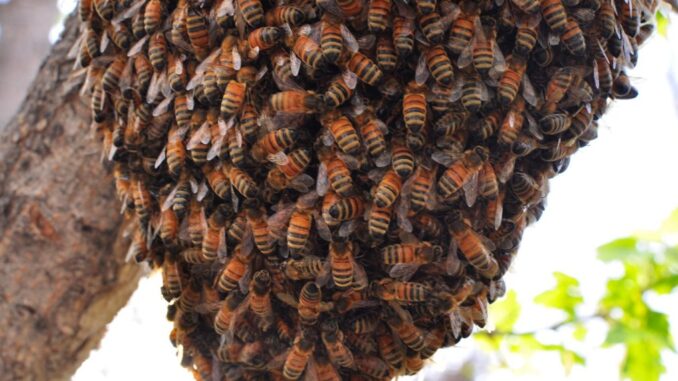
Ogundele Olubukola, a principal laboratory scientist at the Federal University of Agriculture, Abeokuta (FUNAAB), has been selling honey in the last 10 years, harvesting an average of 150 litres of pure bee honey monthly with just 85 hives.
With an average litre of the product going for N1,200, amidst high demand as more people appear to be moving away from sugar consumption, honey seems like the business that could cut down Nigeria’s high unemployment numbers.
“The market is growing, at least judging by the demands we are having. Yes, honey sells once your customer knows you are selling the original,” Mrs Olubukola said.
The employment potential of the honey business is such that a honey farmer could combine the trade with his day job, she said.
As more Nigerians increasingly become health conscious, so does the market for honey expands, and the income that accrue to honey farmers.
Health and dieticians have identified some of the benefits of honey to include better cholesterol and improved immunity.
Apart from this, experts say honey purifies the environment by aiding the abundance of fruits, nuts and seeds through pollination, while also being a revenue spinner for the government through job creation.
However, key players in the sector who spoke with this medium said its potentials have been under-utilised.
Potentials
Elumezie Ifeanyichukwu, a biochemist, said he has been in the honey business for three years while also maintaining his professional job.
“My experience for three years shows that each harvest from one hive with a healthy colony gives between 15 to 20 liters of honey.Though I started with only one hive, the one I was empowered with. I now have 23 hives,” he said.
Twenty five years ago, Dagunduro Gideon started as a honey farmer with 20 hives. Today, he has expanded the hives (a structure that houses the honeybees) to 2,000.
The production capacity of his farm is five tonnes every year. Mr Dagunduro is the president of Grassroots Beekeepers in Nigeria.
At his Gwagwalada apiary, he showed PREMIUM TIMES pure raw honey harvested from the hives tied to one of the trees. The continuous buzz from the bees as the smoke reduces their attacks was a pointer to the kind of energy needed for the trade.
He said that there is a high demand for the commodity, just as there is room for more beekeepers.
Corroborating this, Gideon Adebayo, a trained modern beekeeper, also said in a telephone interview that: “Honey farming is a lucrative business. If you invest in it, there’s a lot of products in beehives.”
Also, an agriculture economist, Joanna Raymond, echoed the same conclusion. “Honey business is very lucrative where you make your money without spending much. I started with as little as one hive, now I have 15 hives,” she said.
Underutilised
Nigeria’s honey sector, with a large market size, seems to have a shortfall of producers. In a report published in December 2018, the ministry of agriculture said Nigeria spends over $2bn annually on the importation of honey.
Chinyere Akujobi of ApiExpo Africa said this was unacceptable given the untapped potential in the honey business in Nigeria.
“The opportunity in beekeeping is huge as Nigeria spends billions of naira annually to import the commodity,” she said.
Way forward
Johnson Oluwaseun, an entomologist, and the public relations officer, Youth for Apiculture Initiative, said in a telephone interview that the government has a big role to play in making the sector viable.
“The first facet is legislation. There should be legislation that is supportive of the industry. Nigeria doesn’t have a beekeeping policy, and especially those involving insecticides that affects the growth of bees.
“There is a need for orientation, a private entity cannot do this. For instance, the Ministry of Agriculture, and the Ministry of Environment can set out projects for honey hunters in villages and for modern beekeeping that does not involve the killing of the bees,” he said.
He revealed that there is no Nigerian university that offers Entomology (study of insects) at an undergraduate level, arguing that it was important that beekeeping be taught to encourage its practice.
Honey is produced in two ways. It is either organic or conventional. To produce organic honey, a policy of government is required, the national president of the federation beekeepers association of Nigeria, Bidemi Ojeleye, said.
Mr Ojeleye, who is also the founder of the centre for bee research and development, Ibadan, added that the organic honey is needed to be produced within 20 to 25 metres radius where pesticides and other chemicals are not used at all.
“That is why the government should reveal some areas for beekeepers in Nigeria, and make use of those areas. But if its conventional, nothing happens to it, unless you infuse into it, then you have to declare the content you infused into it,” he said.
The honey industry is also challenged with adulterated products that are passed off as original. This concern has reduced the demand for honey.
Although there are rudimentary methods of checking for authenticity like using matches flame and water to identify whether or not the honey is adulterated, a biochemist, Samuel, said those methods are not reliable.
“Unhealthy management of the hive can lead to bad honey especially during harvest. If honey is harvested with the larva it can lead to contamination. It will have an alcoholic odour and taste. 90 per cent pure honey should give a strong itchy sensation in the throat,” he said.
For those already in the honey business, it is a sector that can impact the economy if the government gives it the right attention, he noted.
END

Be the first to comment